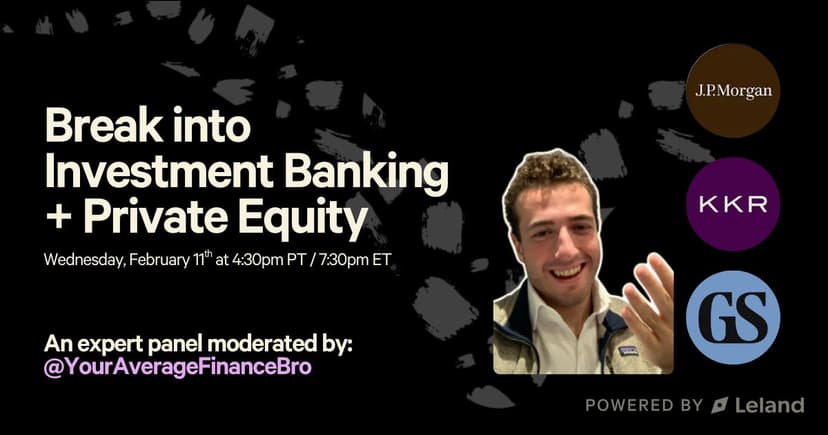The 5 Most Prestigious Private Equity Firms
Discover the top 5 most prestigious private equity firms in the industry and learn about their investment strategies, portfolio companies, and success stories.
Posted June 19, 2025

Join a free event
Learn from top coaches and industry experts in live, interactive sessions you can join for free.
Table of Contents
What is Private Equity?
Private equity refers to investment funds that acquire and manage private companies or engage in buyouts of public companies, ultimately delisting them from public stock exchanges. Unlike public equity, which involves shares traded on stock markets, private equity investments are not publicly traded. These investments are typically made by institutional investors, high-net-worth individuals, and private equity firms. The goal of private equity is to enhance the value of the acquired companies through strategic management, operational improvements, and financial restructuring, eventually selling them at a profit.
Private equity plays a crucial role in the business landscape by providing capital to companies that might not have access to public markets or traditional financing. This capital infusion can help businesses expand, innovate, and improve their operations. Private equity firms usually invest with a long-term perspective, focusing on sectors such as technology, healthcare, manufacturing, and consumer goods. They employ various strategies, including leveraged buyouts, venture capital, growth capital, and distressed investments, to achieve high returns for their investors. Overall, private equity is a dynamic and influential field that significantly impacts the global economy by driving business growth and innovation.
What Makes a Private Equity Firm Prestigious?
Several factors contribute to the prestige of a private equity firm. One key factor is the firm’s track record of successful investments and high returns for its investors. Firms that consistently deliver strong financial performance and exceed benchmarks gain a reputation for excellence. Another important factor is the firm’s expertise and specialization in particular industries or sectors. Firms with deep industry knowledge and a history of successful investments in specific areas are often regarded as leaders in those fields.
Additionally, the caliber of the firm’s leadership and management team plays a crucial role in its prestige. Highly experienced and well-connected professionals with a proven ability to identify valuable investment opportunities and execute complex deals contribute to a firm’s reputation. The size and scale of the firm’s operations also matter; large firms with significant assets under management and a global presence are typically viewed as more prestigious. Lastly, the firm’s involvement in high-profile deals and its influence within the private equity community can enhance its status and recognition.
The 5 Most Prestigious PE Firms
1. Blackstone
- Founded: 1985
- Headquarters: New York, NY
- Total AUM: $1.0 trillion
Blackstone is renowned as the world’s largest alternative asset manager, boasting over $1 trillion in assets under management (AUM). Serving both institutional and individual investors, Blackstone excels in building strong businesses that deliver lasting value. With a vast portfolio that includes approximately 12,500 real estate assets and over 230 portfolio companies, Blackstone strategically invests in dynamic sectors poised for long-term growth. The firm has generated $338 billion in gains for its investors, including retirement systems benefiting over 100 million pensioners. Additionally, Blackstone manages $241 billion in AUM from the private wealth channel, providing access to private markets and institutional-quality investments through partnerships with financial advisors.
Read: How to Ace Your Blackstone PE Interview
2. KKR & Co.
- Founded: 1976
- Headquarters: New York, NY
- Total AUM: $510 billion
KKR & Co. stands out as a leading global investment firm, managing an impressive $183 billion in private equity, $260 billion in credit, $61 billion in infrastructure, and $71 billion in real estate. With a portfolio encompassing over 250 companies, KKR has established itself as a powerhouse in the financial world. Headquartered at 30 Hudson Yards in New York, KKR operates from 27 office locations worldwide. This extensive reach and diverse investment strategy underscore KKR's prestige and influence in the private equity industry, making it one of the top five most prestigious private equity firms globally.
3. Apollo Global Management
- Founded: 1990
- Headquarters: New York, NY
- Total AUM: $598 billion
Apollo Global Management is another powerhouse in the private equity world. Known for its creative structuring and sourcing strategies, Apollo takes a hands-on approach with the management teams of its 300+ portfolio companies across their Equity platform, helping to transform and grow their businesses. With an integrated global platform and origination infrastructure, Apollo manages more than $450 billion in credit assets. This comprehensive approach and significant influence make Apollo Global Management one of the five most prestigious private equity firms globally.
4. TPG
- Founded: 1922
- Headquarters: Fort Worth, TX
- Total AUM: $137 billion
TPG stands out as a leader in the alternative asset space, managing $224 billion in assets with a strong focus on innovation. With over 300 active portfolio companies headquartered in more than 30 countries and a global team of more than 1,800 employees, TPG demonstrates a vast and influential presence. Notably, 75% of TPG’s investors are engaged across three or more of its products, which include Capital ($71B AUM), Growth ($27B AUM), Impact ($19B AUM), TPG Angelo Gordon ($80B AUM), Real Estate ($18B AUM), and Market Solutions ($8B AUM). Headquartered in Fort Worth, Texas, with 31 offices worldwide, TPG's extensive reach and diversified investment platforms solidify its reputation as one of the five most prestigious private equity firms globally.
5. The Carlyle Group
- Founded: 1987
- Headquarters: Washington, D.C.
- Total AUM: $381 billion
The Carlyle Group is a global investment firm dedicated to creating long-term value for investors, companies, shareholders, people, and communities. With 28 offices across four continents and over 2,200 professionals worldwide, The Carlyle Group leverages its expansive global network to deliver top-tier insights and drive positive change. Managing $425 billion in assets across three business segments and 595 investment vehicles, The Carlyle Group is known for investing wisely and responsibly over the long term. These attributes make The Carlyle Group one of the most prestigious private equity firms in the world.
Bonus: Other Major Private Equity Firms
Private equity is a broad field, with a lot of big players. In addition to these “megafunds”, there are also a lot of PE firms that specialize in an industry, geographic sector, or deal size. Here are several more of the largest and most prestigious funds.
- Bain Capital
- Founded: 1984
- Headquarters: Boston, MA
- AUM: $165 billion
- Thoma Bravo
- Founded: 1980
- Headquarters: Chicago, IL
- AUM: $127 billion
- Vista Equity Partners
- Founded: 2000
- Headquarters: Austin, TX
- AUM: $96 billion
- Silver Lake
- Founded: 1999
- Headquarters: Menlo Park, CA
- AUM: $98 billion
- Insight Partners
- Founded: 1995
- Headquarters: New York, NY
- AUM: $90 billion
- CVC Capital Partners
- Founded: 1981
- Headquarters: Luxembourg
- AUM: €186 billion ($201 billion)
- Warburg Pincus
- Founded: 1939
- Headquarters: New York, NY
- AUM: $81 billion
- Advent International
- Founded: 1984
- Headquarters: Boston, MA
- AUM: $94 billion
- EQT
- Founded: 1994
- Headquarters: Sweden
- AUM: $129 billion
Break Into a Top Private Equity Firm With the Help of an Expert
Securing a position at a top private equity firm is challenging, but expert private equity coaches can significantly increase your chances of success by providing personalized strategies, industry insights, and tailored advice. They can help perfect your resume, hone your interview skills, and expand your professional network, paving the way to a career at firms like Blackstone, KKR, Apollo Global Management, TPG, or The Carlyle Group.
Read these next:
- 10 Finance Internships for Freshmen in College
- The Top 10 Private Equity Firms for Manufacturing
- The Top 10 Private Equity Firms for Biotechnology
- The Top 10 Private Equity Firms for Healthcare
- The Top 10 Private Equity Firms for Construction
FAQs
Is private equity a risky job?
- Private equity investments offer substantial opportunities for growth and returns, but they are not without risks. Investors in private equity face various types of risk, including market risk, liquidity risk, and operational risk.
What is the highest position in private equity?
- Managing Director (MD)
- Partner Or Managing Director (MD)
What are private equity firms known for?
- Private equity firms manage investment-related risks, such as regulatory shifts and market fluctuations. They are responsible for devising risk management strategies that safeguard investors' capital and help ensure long-term success.
Do private equity firms pay well?
- Private Equity Firms Salary. $69,000 is the 25th percentile. Salaries below this are outliers. $120,000 is the 75th percentile.
How to know if a company is owned by private equity?
- Check the company's “About Us” or “Our Story” page. A family-owned business will often highlight its local roots and personal investment in the community. On the other hand, phrases like “backed by XYZ Partners” or “a portfolio company of [PE firm name]” can signal private equity involvement.
Browse hundreds of expert coaches
Leland coaches have helped thousands of people achieve their goals. A dedicated mentor can make all the difference.




















